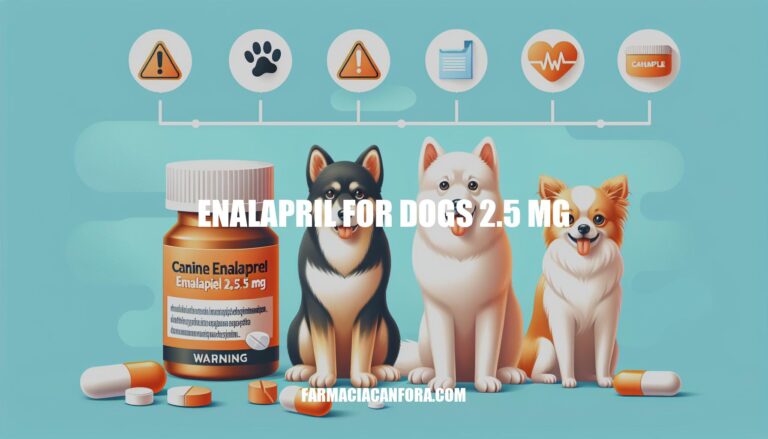


If you’re a devoted pet parent looking to provide the best possible care for your canine companion, understanding the benefits of enalapril for dogs 2.5mg is crucial. This medication, widely prescribed by veterinarians for a range of health issues, plays a vital role in managing conditions like congestive heart failure, high blood pressure, kidney disease, and urinary protein loss in dogs. By delving into the mechanism of action of enalapril and its effectiveness in alleviating these conditions, you’ll gain insight into how this medication can positively impact your dog’s well-being.
When it comes to treating your furry friend’s health issues, veterinarians often turn to enalapril – a medication that’s been used in both human and veterinary medicine for decades. Enalapril is particularly effective in managing conditions like congestive heart failure, high blood pressure, kidney disease, and urinary protein loss in dogs. In fact, the 2.5mg tablet has become a staple in many veterinary practices due to its impressive track record.
So, how does enalapril work its magic? Well, it’s all about understanding the renin-angiotensin-aldosterone system (RAAS) – a complex hormone pathway that regulates blood pressure and fluid balance. When RAAS is activated, it can lead to a range of negative consequences, including increased blood pressure, sodium retention, and reduced blood flow to vital organs.
Enalapril, as an ACE inhibitor, works by blocking the action of angiotensin-converting enzyme (ACE), which is responsible for converting angiotensin I into angiotensin II – a potent vasoconstrictor. By inhibiting this conversion, enalapril reduces blood pressure and alleviates the strain on the heart and kidneys.
But what does this mean for your dog? In practical terms, enalapril can help reduce symptoms of congestive heart failure, such as coughing and difficulty breathing, by reducing the workload on the heart. It can also slow down the progression of kidney disease, helping to preserve renal function and reduce proteinuria (excessive protein in the urine).
When it comes to dosing, enalapril for dogs 2.5mg is typically administered once or twice daily, depending on your dog’s specific needs and health status. It’s essential to work closely with your veterinarian to determine the best treatment plan for your pet.
As with any medication, it’s crucial to monitor your dog for potential side effects and report any concerns to your veterinarian promptly. With proper dosing and monitoring, enalapril can be a highly effective tool in managing your dog’s health issues – giving them a better quality of life and extending their lifespan.
In conclusion, enalapril for dogs 2.5mg is a powerful tool in the hands of veterinarians when it comes to addressing complex health issues such as congestive heart failure, high blood pressure, kidney disease, and urinary protein loss. By inhibiting the renin-angiotensin-aldosterone system and reducing the workload on the heart and kidneys, enalapril can significantly improve your dog’s quality of life and extend their longevity. While monitoring for potential side effects is essential, the benefits of enalapril far outweigh the risks when used under the guidance of a knowledgeable veterinary professional.
So, if your furry friend is struggling with any of the aforementioned conditions, enalapril for dogs 2.5mg could be the key to helping them live a happier and healthier life.